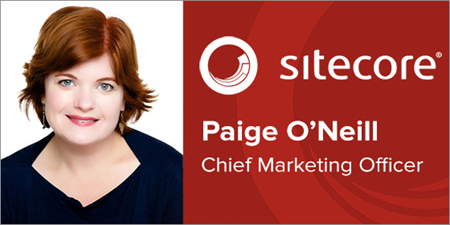Sitecore's CMO Brings Balance of Technology & Marketing
Sitecore, a provider of experience management software, has had a busy year and recently welcomed Paige O’Neill as their new Chief Marketing Officer. Paige is a marketing veteran and customer champion who is passionate about how technology is changing everyday life. The common thread in Paige’s career has been her focus on creating exceptional customer experiences. With over eight years’ experience in the martech industry, Paige previously held the position of CMO at digital platform provider Prysm, where she oversaw the rebranding of the company. Notably she also held the CMO position at SDL. Based in San Francisco, she will lead the company’s global marketing initiatives which include their marketing strategy, product marketing, communications, demand generation, and branding.
“No one is better placed than Paige to inform and inspire the Sitecore community about the opportunity to transform their businesses through superior customer experience,” said Mark Frost, CEO at Sitecore. “She knows the landscape, dynamics, and trends to spot and act on the opportunities that will be critical to achieving our strategic growth initiatives. And as an experienced CMO, she is intimately familiar with the challenges that marketers face to deliver digital experiences that meet ever-rising customer expectations.”
I had the opportunity to connect with Paige and learn more about the perspective she brings to her new role. Read on for Paige’s insights into the changing world of marketing and how CMOs can position themselves and their customers for success.
Exclusive Interview with CMO Paige O’Neill
Let’s start by you telling us a bit of your background in the space prior to becoming the CMO at Sitecore?
 Paige: "Martech is definitely my “first love”. I’ve been involved in the space for almost half of my career, most notably at SDL and Aprimo. In fact, all of my career has been characterized by an excitement about impactful technologies that reshape how we navigate the world and disrupt the status quo. During my time at Aprimo, the martech space was just starting to pick up steam and I really enjoyed watching the impact technology was having on the marketing department. As marketers, we’ve gone from feeling that it was difficult to measure the impact of marketing to having so many great tools and rich data sets to help us prove the significant impact marketing can have on the business."
Paige: "Martech is definitely my “first love”. I’ve been involved in the space for almost half of my career, most notably at SDL and Aprimo. In fact, all of my career has been characterized by an excitement about impactful technologies that reshape how we navigate the world and disrupt the status quo. During my time at Aprimo, the martech space was just starting to pick up steam and I really enjoyed watching the impact technology was having on the marketing department. As marketers, we’ve gone from feeling that it was difficult to measure the impact of marketing to having so many great tools and rich data sets to help us prove the significant impact marketing can have on the business."
What inspired you to join Sitecore?
Paige: "Sitecore is a company I’ve long admired, and I’m very familiar with their market space from my SDL days. The company has a rich history of innovation, a strong market leadership position with its technology, and such a passionate customer and develop community. Digital Experience is also an area that continues to become more important to marketers as they look to develop richer customer connections, and so the opportunity to help Sitecore drive those conversations was super exciting to me."
Where do you think strategic growth opportunities for Sitecore are as you see them?
Paige: "Sitecore’s opportunity is to help marketers transform how they are engaging with their customers. In particular, customers are sharing more data about themselves but, in return, they expect a rich, personalized experience that responds to their individual needs. Our most strategic opportunity is to show companies how their investment in Sitecore will help them to realize the potential of marketing to customers as individuals, and then guide them on how to reach that promised land."
What challenges do marketers currently face or what are some trends that will significantly impact the way marketers can execute on an effective digital experience?
Paige: "Marketers today have to begin with an understanding that consumers, not companies, will decide when, where, and how they want to engage. Increasingly, the winners and losers in any market will be defined by the ability to deliver experiences that are aware and adaptive to individual customers’ specific needs and requests, and do so in a way that is seamless to the end-user. In many cases, though, consumers’ expectations outpace companies’ abilities; most organizations are still early in their efforts to transform the business for a digital world. Getting there will take an investment in technology, and we’ll see marketers rely more on things like channel-agnostic services that keep content-rich experiences at the center of engagement; machine learning capabilities that augment, automate, and amplify their efforts; and data management systems that place a heightened emphasis on transparency and end-user control over the personal data they collect and use. But marketers are also going to have to rethink their people and processes so they have the right training and organizational design to make sure they can leverage the power of those technology investments."
“Connect Your Martech with Your Customers”
According to new research by Sitecore and Avanade in which they surveyed a total of 1,440 CIOs, CTOs, CMOs and other senior decision makers, a majority of businesses are missing sales and revenue as a result of inefficient marketing technology. The study named “Connect your martech with your customers” found that a staggering 95% of organizations say their customer experience is in critical need of improvement.
While martech can serve as the foundation of great customer experience if it is done right, most companies find it difficult to achieve. Without an optimized martech stack, companies struggle to deliver a consistent CX – effectively leaving money on the table.
Nearly all respondents cited a lack of maturity in their marketing technology and poor collaboration between CIOs and CMOs as key barriers preventing them in delivering great customer experiences. Businesses need to focus on working with the best partners to augment their skillsets and train employees for collaboration. Today, more than half of marketing respondents say their martech stack is not user friendly, and marketing employees do not receive the necessary martech training. Balancing technology and marketing needs is becoming a business imperative for companies to connect with their customers.
“When there is a disjointed customer experience with a business, there is a lost competitive advantage. IT and marketing must align to solve this challenge and leverage the right technology and a digital strategy that prioritizes a customer-centric approach, including personalized experiences and a trusted customer relationship,” said Anil Gupta, Executive Vice President of Program Management at Sitecore.
Ending Notes
This has been quite a year for Sitecore and they started off with a bang. Firstly they were recognized as a leader in the 2018 Gartner Magic Quadrant for Digital Experience Platforms, and since then they have hit several other significant milestones. In January they expanded their partnership with Stackla which integrates its UGC platform with all Sitecore Experience Cloud Products. The company then released Sitecore Experience Commerce 9 and my colleague Venus was able to have a sit down with Ryan Donovan at the Sitecore Symposium where they discussed the ins and outs of version 9. Lastly they delivered their ‘phase one’ of the Sitecore Connect Software for Salesforce Marketing Cloud customers.
Sitecore has always had a commitment to empowering marketers to personalize the holistic digital and customer experience. With Paige at the helm of their marketing strategies it will be interesting to see what else Sitecore will do to bring the balance of technology and marketing to their clients in order to help them connect with their customers.

Natalie Evans
Natalie Evans has over 16-years in the tech industry and currently works as the event coordinator and tech reporter for CMS-Connected, keeping up-to-date on what's happening in and around the Content Management industry.